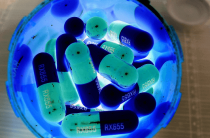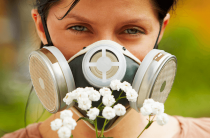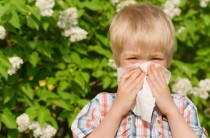Some 40 years ago, people did not even hear what an allergy is. This disease was not of a mass nature and was the lot of isolated cases. Now look at what is happening now: every fifth inhabitant of the planet undergoes negative consequences from allergic reactions, allergy medicines are one of the most popular and best-selling drugs, and an allergist is a profession that is most in demand not only among medical workers. .
With the exception of severe forms of allergy (asthma, anaphylactic shock, Quincke's edema), as such, allergy symptoms are not threatening for the patient and are successfully stopped by modern allergy medications, of which there are a great many. Alas, during pregnancy, the course of an allergy is an extremely unfavorable phenomenon, because the mother's body begins to experience increased stress during an allergic reaction (in addition to the actual stress from bearing a child). Therefore, the prevention of disorders caused by allergies comes to the fore during pregnancy.
Allergy is a disease that is prone to hereditary transmission. The risk is doubled if the father and mother of the child are allergic. Although, this does not mean that even under such a circumstance a child will be born with an allergy with a 100% probability, fortunately not. A characteristic feature of hereditary transmission is that allergy is transmitted not as such, but as a pathological response of the nervous system in response to its pathogens. So, for example, if the mother is allergic to dust, then the child may be, for example, allergic to the flowering of ragweed.
Parents who suffer from allergies should pay special attention to the prevention of this disease in a child.
Allergy during pregnancy
During pregnancy, the mother's body literally experiences a failure. Therefore, the course of allergies during pregnancy is predictable
Pregnancy involves numerous changes in a woman's body. The fetus that matures in the female womb is very sensitive to various changes that occur with the mother's body. During pregnancy, the course of many diseases becomes unpredictable. This applies in particular to allergic diseases. For pregnant women with allergies, the following variants of the development of the disease are characteristic:
- An allergic disease may stop as a result of an increase in the level of cortisol in the blood. Cortisol is a stress hormone that has an anti-inflammatory effect, as well as eliminating allergy symptoms;
- An allergic reaction may get worse. Pregnancy brings confusion to the immune system. In this condition, the immunity of a pregnant woman becomes hyperactive, in relation to various environmental factors. This may contribute to allergic reactions.
- The course of the allergy will remain unchanged. Although, this variant of the development of this disease is rare, in view of the fact that pregnancy makes significant changes to the functioning of the immune system;
- A pregnant woman will develop an allergic disease due to a change in the functioning of the body
The symptoms of this disease during pregnancy are also not ordered in nature, as in the normal state. Atypical combinations of allergic symptoms, paradoxical forms of its manifestation are noted.
Allergy symptoms during pregnancy
- Skin manifestations that are manifested by dermatological rashes, redness, which are accompanied by burning and peeling of the skin;
- Symptoms of allergic rhinitis: nasal congestion, clear discharge, redness of the eyes, tearfulness, difficulty in nasal breathing;
- Edema of the mucous membranes (nose, larynx, oral cavity);
- Increased body temperature, feeling of ache in the joints, weakness;
- Sleep disturbance, irritability;
- Constant sneezing;
Symptoms of pregnancy with allergies must be stopped as quickly as possible, but without harm to the health of the mother and child. After all, manifestations of allergies can cause significant anxiety in the mother, which also negatively affects the unborn child.
Allergy treatment during pregnancy
The basis of this method is the introduction into the body of small dosages of substances to which the patient has an allergy. A low dosage of the allergen and constant contact with it accustoms the patient's body and makes him lose sensitivity for a while. Often, special solutions are used, which are obtained by the method of water-salt extraction.
At the moment, work is underway to extract protein molecules - allergens. After all, immunoglobulins react precisely to protein structures, which themselves, being proteins, provoke a reaction from our immunity. This will make it possible to create drugs for the immunotherapy of allergic diseases that are highly pure in pharmacological terms, as well as with a high degree of specificity.
This method is generally effective in the treatment of allergic diseases. However, there is a significant nuance in its application. The fact is that despite the minimum amount of active substance, it is still an allergen. If the patient's body is highly sensitive, then this can turn into undesirable side effects for him, moreover, in an acute form. This requires compliance with increased safety measures for this type of treatment.
Another feature of this method is the unpredictability in terms of therapeutic effects. So, in one patient, immunotherapy can remove the manifestations of allergy symptoms for several months, and in another for several years.
If the mother suffers from allergic reactions, then immunotherapy is necessary even before the intended conception. Indeed, during pregnancy, these activities are not recommended due to the increased potential danger.
Medications during pregnancy
Antihistamines are drugs that relieve allergy symptoms by interrupting the chain of allergic reactions. They are among the most medicinal preparations in general. A large number of advertisements for these substances on television determines their wide popularity, and hence their uncontrolled use. This is unacceptable in principle, and even more so during pregnancy. The fact is that many of these drugs, which are safe for the average person and even recommended for use in the treatment of allergies in children, cause negative changes in the fetus.
It must be remembered that even if you are very bothered by allergy symptoms, this is not at all a reason to go to the pharmacy on your own and buy advertised antihistamines. These allergy remedies are effective and safe only if used correctly. Under the condition of an illiterate approach to their use, the harm to the health of the mother and child can far exceed the harm from allergy symptoms.
First-generation antihistamines (diphenhydramine, tavegil, diazolin, etc.) have a significant number of side effects, including: depression of the central nervous system, dry mouth, stomach and intestinal upsets. In addition, they provoke cardiovascular disorders in the fetus. Therefore, they are used only in case of a direct threat to the health and life of the mother and child.
Second and third generation drugs (suprastin, claritin, citresin, fexofenadine) are used with great caution, in the case of a thorough study of the risk of side effects for the mother and child.
Prevention of allergies during pregnancy
And so, as we see, an allergy medicine that would not cause side effects for the health of the mother and fetus, unfortunately, has not been found to date. This means that the prevention of allergic manifestations comes to the fore. Fortunately, this can be done if you strictly adhere to certain rules.
Maternal Allergy Prevention Means
- Stay in a clean, well-ventilated area;
- Regularly carry out wet cleaning in order to prevent the spraying of potential respiratory allergy factors (animal dander, dust, color of plants);
- As much as possible, and preferably, completely isolate yourself from the source of the allergy;
- Use air conditioners, purifiers and humidifiers that help clean indoor air from the presence of likely allergens;
- Do not eat foods that provoke allergic reactions;
- Try to do without a large number of cosmetic, as well as non-natural products. If possible, use hygiene products that do not contain harmful chemicals. For example, laundry soap, which, without a pleasant smell, is the least allergenic. Another example is dishwashing detergents, which are successfully replaced by mustard powder.
Fetal Allergy Prevention Means
- Use a full cycle of breastfeeding. After all, nothing is more important for a child's health than mother's milk. Alas, the practice of using dry mixes for no apparent reason is now common. This is fundamentally wrong, which is confirmed by a large number of statistical materials generated in the course of medical research. So it was found that children who did not have breastfeeding or lost it for up to 4 months are more susceptible to allergic diseases than their peers who received a sufficient amount of mother's milk;
- During feeding, follow a special hypoallergenic diet. Eliminate from your diet foods of unnatural origin, as well as those that contain large quantities of preservatives, flavor enhancers, sweeteners and other unnatural substances with an irritating effect on the child's immunity;
- When the child switches to normal food, his diet should consist of natural products that have a high biological value. We recommend that you consult with your doctor about organizing a diet for your child.
We warn you that self-medication is potentially hazardous to your health. In no case do not treat and diagnose allergic diseases except under the supervision of an experienced specialist. Self-medication during pregnancy can lead to negative consequences for the health of the mother and the unborn child.















